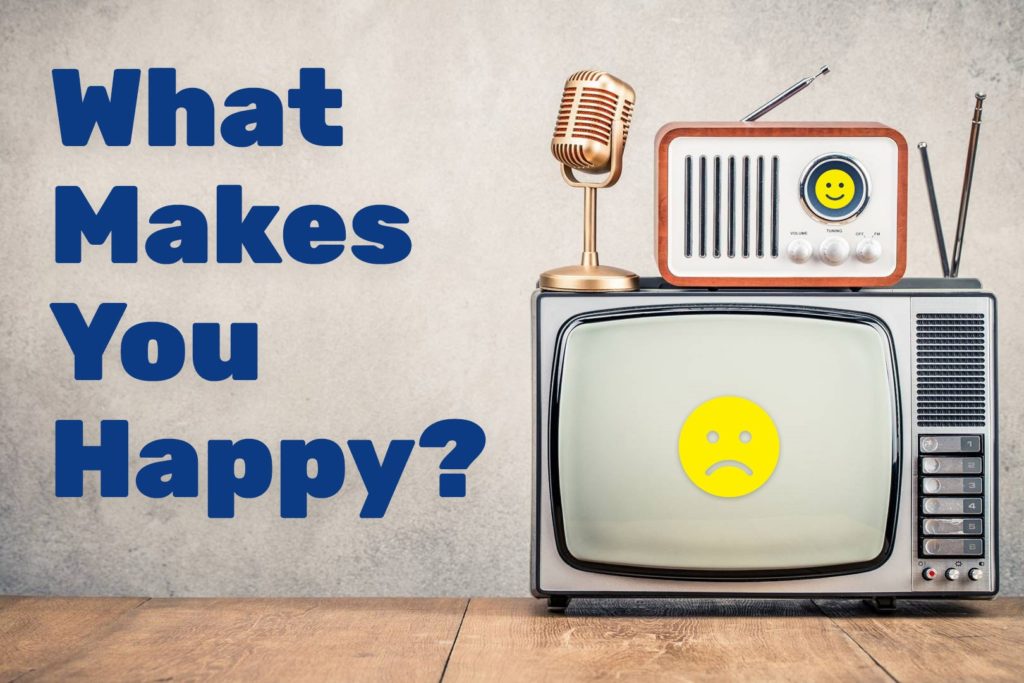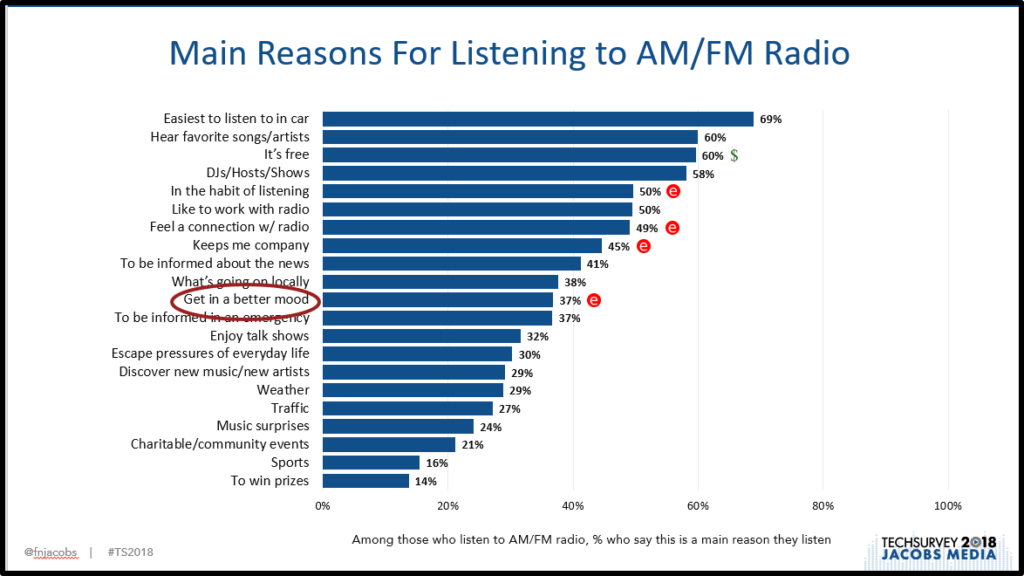
There’s so much amazing content on television these days, whether it’s Netflix, Hulu, YouTube, or broadcast TV networks. The most recent estimate is there are nearly 500 scripted shows on TV in 2018, signaling the continuation of a renaissance for tube lovers. That’s a lot of television.
But now a study in Psychology Today suggests that TV viewing may in fact depress you. A Turkish researcher, Gul Gunaydin, studied the viewing patterns of 1,700 adults (aged 33-45) discovered a cycle that habitual TV viewing leads to unhappiness.
The website, Big Think, wrote this headline to sum up the cause and effect between TV viewing and mood:
“TV makes you unhappy, and unhappy people watch more TV”
But have you ever heard of radio leading to unhappiness? it just doesn’t happen.
And I’ve got the data to back it up. In our new Techsurvey 2018, we ask all 64,000+ respondents to identify the main reasons they enjoy listening to broadcast radio.
While tangibles like music and personality always rate very high, it turns out there are emotional benefits to listening to radio.
First and foremost, listening to more radio may not, in fact, lead to angst and depression.
The chart below shows the key motivators that drive broadcast radio listening. Note that half say they’re in the habit of listening and they feel a connection to radio. For 45% of the sample, radio provides companionship. But what jumps out on this chart is that well more than one-third say they’re motivated to tune in broadcast radio because it helps get them in a better mood.

That’s contrary to that Psychology Today study that points to the notion that TV viewing – especially a lot of it – can lead to depression and anxiety. On the radio, most people are singing along with their favorite songs, laughing at an entertaining morning show, or being stimulated by a talk show.
Several years ago during the teeth of the Great Recession, I conducted a series of Listener Advisory Board Groups here in Detroit for both WRIF and WCSX. Those were tough days in America and in the Motor City, and a majority of our respondents were either unemployed or working for significantly less money in less desirable jobs. One lost his car, and took a bus to the station that night. Another sadly admitted he had recently become homeless.
It was heartbreaking. Many spoke about how they were underwater on their homes, despondent about their job prospects, and stressed out with economic pressures threatening their livelihoods and their families. On top of that, they were convinced the region would never make a comeback, and their futures were dim.
So, how did they relieve all that angst and tension?
They told us our radio stations were an audio elixir during those challenging, trying times. The music, the DJs, ticket giveaways, and the chance to go to free downtown concerts were all key factors in them staying upbeat, positive, and hopeful throughout the crisis.
Detroit has recovered, coming out of bankruptcy, and earning the title of “Comeback City.” Most people here in the metro area are now gainfully employed, enjoying living in the Great Lakes State again.
But nearly a decade ago, it wasn’t like that.
And they had FM music radio as a form of free, upbeat, entertainment to keep them company during the most challenging of times. In Techsurvey, when you dig a little deeper into the subgroups that are especially likely to point to radio as a mood elevator, you see spikes among women, young people, ethnic minorities, and music radio fans. (Interestingly, those who enjoy spoken word formats – news/talk and sports – are the least likely to view broadcast radio as a way to improve their psyches.)
Maybe part of broadcast radio’s appeal is its unique ability to be both foreground and background. Unlike television where you’re either watching or you’re not, radio is very often accompanied by other activities, including working, exercising, and driving. When us programmers are doing our jobs, our music programming and our personalities are enhancements, providing a soundtracks to people’s lives.
I often marvel at the way truly great on-air personalities are somehow able to put their own ailments, worries, and troubles aside when they walk into that studio and turn on the mic. Like the people they serve, they also have troubles and angst, not to mention performance pressure that comes with the ongoing weight of being rated nearly every week of the year.
The best of the best are able to compartmentalize their own aggravation, and remain upbeat, positive, and energetic. More often than not, those are the types of qualities listeners tell us they appreciate in their favorite air personalities.

Until Psychology Today (or some other research company) attempts to measure the mental health and happiness of radio listeners, we won’t truly have a gauge to compare audiences.
But I’ve seen enough Techsurvey data to know that radio done well is an uplifting, fun way to spend time, whether you’re hanging out at home, on the job, or driving from Point A to Point B.
As for television, you can read the Psychology Today findings here.
Want to be happy? Turn on the radio.
Thanks, Chris Firmage.
- The Guy In The Next Car - May 6, 2025
- 5 Lessons For Radio From The Apple Watch - May 5, 2025
- DJs And Baristas: Can They Save Their Companies? - May 2, 2025




Going on 100 and still making folks smile. And, more! Don’t Stop! Who Listens To Radio (Stereo) – Stan Freberg – Sarah Vaughan …
https://www.youtube.com/watch?v=9tViJmYREkc
Thanks, Clark.
Love this, Fred! I think my favorite line is: “Maybe part of broadcast radio’s appeal is its unique ability to be both foreground and background.” That just took me back to being a kid and falling in love with radio. You could love all the music while doing homework or biking down to the store on an errand for mom…but you also hung on every word of the great personalities. I guess for me, it somehow managed to be both foreground AND background simultaneously–something I strive to keep in mind in my own work. Thanks, Fred, a great upper for all us radio fans!
Many thanks, Dave, for the observations and reading our blog.